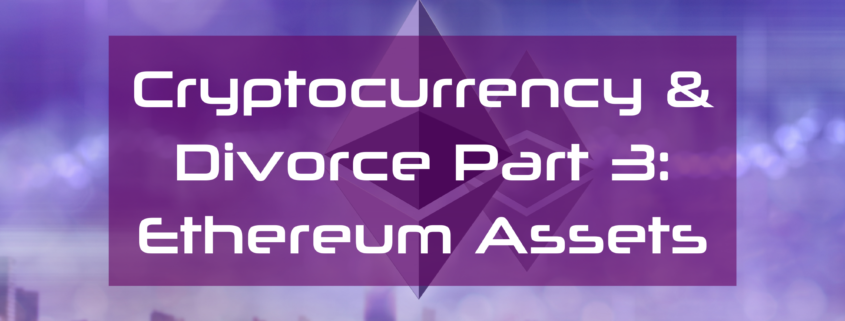Divorce and Cryptocurrencies Part 3: Ethereum Assets.
There’s no doubt that cryptocurrency nowadays can add new complications to divorce. Popular crypto assets like Bitcoin and Ethereum rise (and fall) dramatically in price making them often highly volatile. If you have an impending divorce on your hands, you need to know how to find, value and divide these new world assets. Here’s what you should know.
In the second part of our Cryptocurrencies and Divorce series, we discussed the situations in which cryptocurrency can be found during the divorce settlement process and also if it can be lost within the settlement. While tracking down the funds isn’t an easy process, our third part of the series will give you a little more insight on the Cryptocurrency Ethereum Assets.
If you or your spouse owns cryptocurrency, you are going to want to make sure it is discussed with your divorce attorney. It may be a marital asset that needs to be valued and divided; but due to cryptocurrency wildly fluctuating, it can sometimes be problematic to value, and therefore split, fairly.
Here’s what you need to know about handling Ethereum Assets amid divorce.
What is Ethereum?
Ethereum, also known as ETH, is a decentralized, open-source blockchain with smart contract functionality. Currently, Ethereum is the largest and most well-established, open-ended decentralized software platform.
Ethereum comes with its own programming language that runs on a blockchain, enabling developers to build and run distributed applications. The potential applications of Ethereum are wide-ranging and are powered by its native cryptographic token, (ETH).
Ether is used mainly for two purposes: It is traded as a digital currency on exchanges in the same way as other cryptocurrencies, and it is used on the Ethereum network to run applications. According to Ethereum, “people all over the world use ETH to make payments, as a store of value, or as collateral.”
Bitcoin Vs. Ethereum
Ether and Bitcoin are similar and also differ in many ways: Each is a digital currency traded via online exchanges and stored in various types of cryptocurrency wallets. Both of these tokens are not issued or regulated by a central bank or other authority. Both make use of the distributed ledger technology known as blockchain.
Transactions on the Ethereum network may contain executable code, while data affixed to Bitcoin network transactions are generally only for keeping notes. BTC and ETH are both digital currencies, but the primary purpose of ether is not to establish itself as an alternative monetary system but rather to facilitate and monetize the operation of the Ethereum smart contract and dApp platform.
The ultimate main difference between the two is that Bitcoin is primarily designed to be an alternative to traditional currencies and a way to exchange and store value. Ethereum is a programmable blockchain that finds application in numerous areas, including DeFi, smart contracts, and NFTs.
Ethereum is another use case for a blockchain that supports the Bitcoin network and theoretically does not compete with Bitcoin. However, the popularity of ether has pushed it into competition with all other cryptocurrencies, especially from the perspective of traders. For most of its history since the mid-2015 launch, ether has been close behind Bitcoin on rankings of the top cryptocurrencies by market cap.
Finding & Splitting Ethereum Assets
While Bitcoin and Ethereum are not the same thing, it’s important to know that Ethereum can be just as easily divided as Bitcoin. When Bitcoin is considered marital property, the easiest way to divide them is to split the determined value 50/50. Since most Bitcoin can be cashed out in full, splitting the value 50/50 means each spouse would simply get half.
Another way to divide cryptos is by negotiating other marital property in exchange. If the spouse with the cryptocurrencies wants to keep them, they can give up other marital property with the same determined value to the other spouse.
The costs associated with uncovering hidden cryptocurrency assets can also be substantial. Before moving forward with a court order to uncover potential hidden crypto assets, a spouse and their divorce lawyers may want to make sure that they are relatively certain about the outcome.
The amount of money involved is also a consideration. People with a few hundred or even a few thousand dollars in undisclosed cryptocurrency are rarely the proper target of such an investigation. An experienced family law attorney may help a spouse concerned about crypto assets decide whether or how to pursue a court order and full forensic investigation.
Final Thoughts
Living in a digital age like we do today, Bitcoin, Ethereum, and other cryptocurrencies are expected to pop up in a divorce settlement. It is important to be prepared and make sure that crypto is properly discovered and valued in family law matters. If you know or suspect that cryptocurrency will be a part of your divorce, talk to your family law attorney immediately and put together a game plan for dealing with it.
Our team of attorneys are highly experienced in dealing with Cryptocurrencies in divorce and are here to answer your questions about divorce and digital asset division.
Contact us today for more information, or to schedule a consultation.











